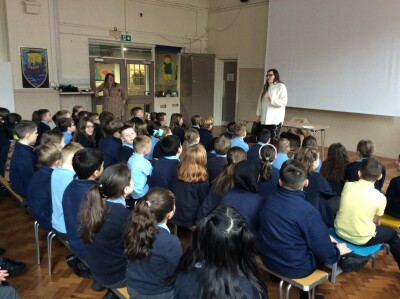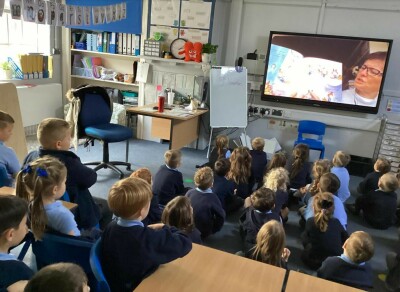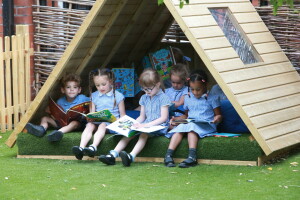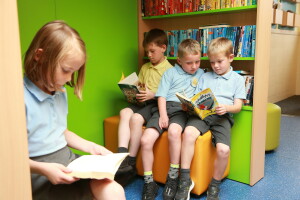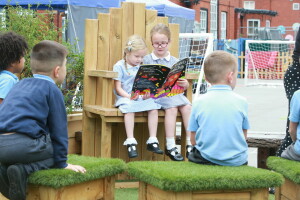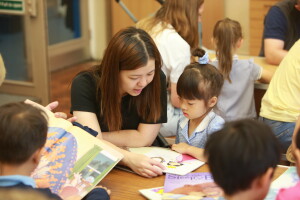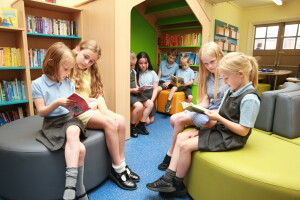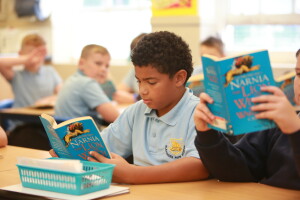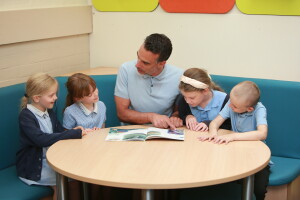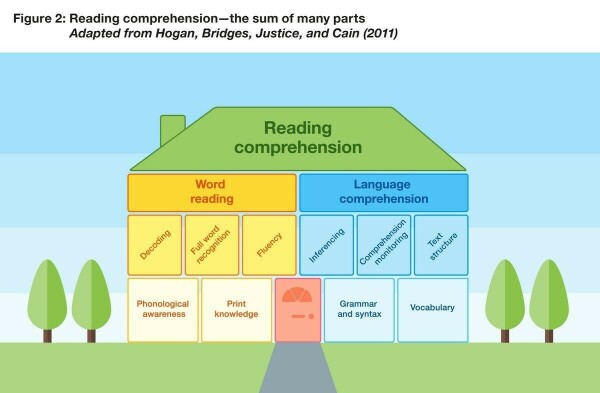At Alexandra Park, we value the importance of developing a positive reading culture and love of reading across all year groups. We have a commitment to ensuring all children are able to see themselves and their communities reflected in the books they either read or are exposed to through our rich and varied curriculum. Our reading spine is designed to match our school values, develop learning behaviours, support and link to other curriculum areas, develop an awareness and understanding of protected characteristics, British values and to challenge the children’s reading ability. Children have access to a wide range of further texts in our library, which is visited by each class weekly. Here, children are supported with the selection of new books and are encouraged to discuss different authors depending on their interests and current learning topics.
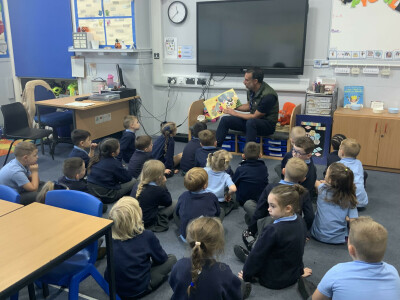
Mr Brooke - Headteacher - enjoying one of his regular story time sessions with Key Stage 1
Our School Library
We have worked hard to create a calm, inspiring library space for children to enjoy. The children are inspired by the art work around the
library and have lots of opportunities to explore the different fiction and non-fiction sections around the room. Weekly library slots help children to discuss different authors and illustrators based on their interests, prior reading and current curriculum units of work. Our Reading Ambassadors help to maintain the library and enjoy using this space to read with other children and organise showcasing of books e.g. Monthly recommended reads. As well as our library space, we also have a designated quiet area at lunchtimes that children can access to engage in reading. Here, a member of staff facilitates book talk and supports children with their love and interest in reading.
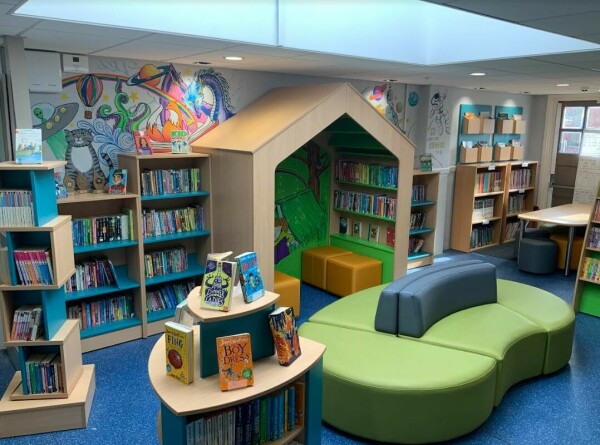
Reading Ambassadors
At Alexandra Park, we continue to involved the children in developing our reading culture. We are proud to have new Reading Ambassadors in post who are going to share their passion with the school community this year. They already have some amazing ideas for activities, events and opportunities.
During the autumn term, they have helped with the re-organisation of our school library, helped pupils with loaning out new books to take home, set up recommended reading areas and read stories to our EYFS and KS1 children. They are now looking forward to becoming more involved in our lunchtime reading clubs and generating ideas for whole school projects such as World Book Day, Vocabulary Day and Drop Everything and Read afternoons.
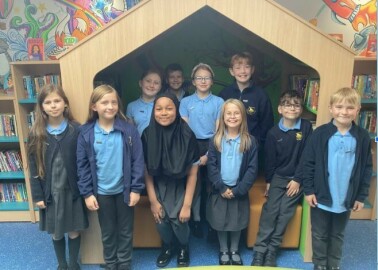
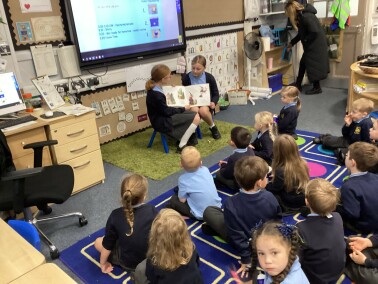
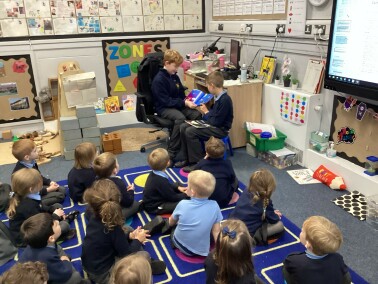
Reading Spine
Children will be both inspired to read and inspired by reading and texts will be carefully chosen to match our school values, develop learning behaviours, support and link to other curriculum areas, develop an awareness and understanding of protected characteristics, British values and to challenge the children’s reading ability. A broad reading diet that develops every child’s ability to care, empathise, respect and understand themselves, others and the world in which they live. Our progression of texts ensures children learn about how other people’s lives differ from their own and build an understanding and tolerance of difference. Also, they will learn about current issues and how to show care for people, animals and the world.
Story Time
All teachers enjoy reading to their children for pleasure. We have protected time during the school week where this is prioritised to allow for shared enjoyment of a text. This will include a range of different text types including poetry, picture books and chapter books. These books are carefully selected to develop our school values and learning behaviours as well as ensuring there is exposure and conversations around key themes. We ensure across the breadth of our curriculum that children listen to stories/texts for all protected characteristics. It's important to us that our children develop a deeper understanding and respect for diversity and empathy. Further to this, our text choices also embed the British Values and are linked to other curriculum areas. Within our story time structure, children have the opportunity to vote on which text to read and in some year groups, a text leads to debates.
As part of our curriculum, children have the opportunity to choose books to read be taught how to choose appropriately. Furthermore, they engage in discussions about books that are read to them and those they can read for themselves, building on their own and others’ ideas and challenging views courteously. They recommend texts to peers giving reasons for their choice and complete book reviews. Children compare characters, settings and themes within and across texts.
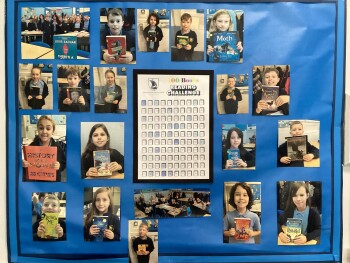
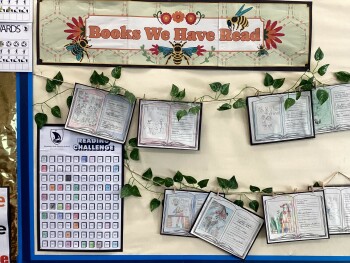
Parental engagement
Reading diaries are sent home across school to promote communication about reading. We want our children to love reading – and to want to read for themselves. This is why we put our efforts into making sure they develop a love of books as well as learning to read. We know that one of the best ways to do this is to make reading a social, enjoyable activity for children. Stay and read sessions are held weekly where parents are encouraged to talk about what they have been reading with their child, share recommendations as well as showing children how much all the adults in their lives value reading.
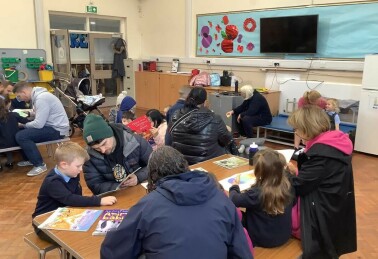
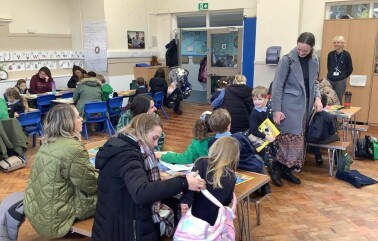
We encourage parents/carers to read with their child regularly and this can be logged in their reading records which help us build up a picture of each child as a reader. Many teachers are parents themselves and know the challenges of getting children to read at home. To help, try to make reading fun, relevant and a habit.
Fun - separate reading practice from reading for pleasure. Let them choose a book for you to read, find an audio book for them to get lost in, read a book that has been made into a film (read it before or after watching the film).
Relevant - let them choose what to read (a blog, information, comics/graphic novels, magazines, web pages), find texts that are relevant to them.
Habit - put aside a set time for reading, don’t try and do other things at the same time, have family reading time where everyone spends time reading.
To help support parents' understanding of phonics and reading comprehension, we deliver workshops and events. Alongside parents' evenings, this is a good opportunity for providing extra resources and answering questions about engagement, text choices and promoting a positive reading culture outside of the classroom.
As well as our whole school general newsletter, we also share a half-termly newsletter dedicated to reading to inform parents what we are doing to develop our reading curriculum, reading culture and reading for pleasure. Please see the newsletters below for more information on these.
Engaging Texts
In addition to our reading spine, we work hard to ensure children have access to a range of age appropriate, challenging and engaging texts in different ways. Our library is home to our Top 100 Reading Books Challenge, where children can enjoy books from a range of diverse authors and illustrators. Equally, these books have been carefully selected to ensure there is diversity and empathy embedded within their content. The children have been extremely motivated to read these books and work together as a class to try and read all 100 books throughout the year. During curriculum time, children have the opportunity to present book reviews and recommend books to each other which helps develop an awareness of more authors and a positive reading culture across our school. The class teacher also takes part in this to model what effective book conversations might look like.
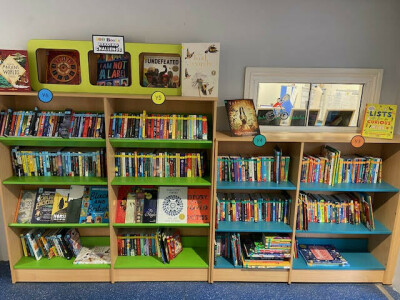
Author Visits and Workshops
Our children enjoy meeting different authors and illustrators. We have had the opportunity to participate in workshops in school as well as taking part in online virtual sessions in different year groups. Children then have the opportunity to read and discuss these books back in the classroom and consider future books that are similar. They enjoy asking questions to real authors and hearing about their learning journey throughout their career and how it might inspire them to pursue their aspirations, too.
